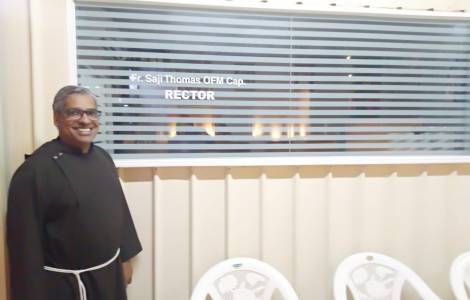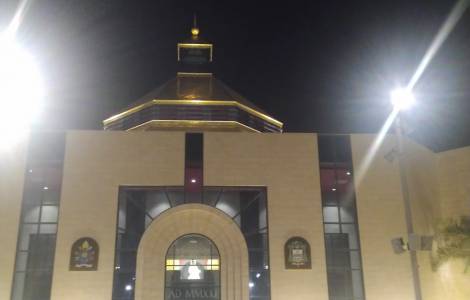
AP
Awali (Agenzia Fides) - The Cathedral of Our Lady of Arabia, in Awali, also known as the Cathedral in the Desert, in addition to its predominantly religious nature, is a place of welcome and sharing for thousands of people, immigrants, workers, families, young people.
Fides News Agency met the Rector, Fr. Saji Thomas, OFM Cap.,a missionary in Bahrain since 2013. Together with three other priests, he is responsible for pastoral care in the Cathedral.
.
"It is a wonderful and enriching experience for me - says the Capuchin friar who arrived in Bahrain on December 4, 2013 at the request of the religious Superiors. Every day I meet hundreds, thousands of people of different nationalities, cultures and languages with whom we share the love of Christ. As Rector of the Cathedral, I administer the sacraments, provide pastoral care and am there for the needs of all those who visit us and with whom we pray".
"We also have many tourists who come from different countries to visit the cathedral. We explain to them the meaning and importance of this sacred place of ours. The Cathedral of Bahrain is a symbol of freedom and religious coexistence. We organize here many spiritual activities, retreats, training courses and, above all, for the Jubilee Year of St. Arethas and Companion Martyrs, inaugurated on October 24, 2023 by Bishop Aldo Berardi, Vicar Apostolic of Northern Arabia, we have many pilgrimages".
"The Cathedral, as such, is not a parish - explains the Rector - every day hundreds of people attend the masses that we celebrate in the different rites. Basically we have four: the Latin, the Maronite, the Syro Malabar and the Syro Malankara. On weekdays, around a hundred people take part in the masses, while at the weekend, that is, on Fridays, Saturdays and Sundays, there are two to three thousand people. During holiday seasons such as Christmas, New Year and Easter we have more than three thousand people attending church services".
Father Saji points to the "pilgrim" character of the Bahraini Church, a "transition church" in which even priests, nuns and bishops come predominantly from other countries, and reflects on the current socio-economic context involving the faithful. "The global economy is facing major challenges that are impacting people very quickly. Many are losing their jobs or not being paid and are having difficulty managing their daily lives," he emphasizes. "In addition - explains the Capuchin - "migration, in which everyone who is looking for a better life is involved, unfortunately often brings with it many problems. Many are offered prospects of well-paid jobs, but by fake agencies that send them here. Once they arrive, they have no work and often cannot return home because they have sold everything to pay the agencies". "Among the problems we encounter in the younger generations - concluded Father Saji - there is the presence of mixed cultures, which over time leads to the loss of their original culture. Young people try to adapt to other cultures and lose in the process the fundamental values they grew up with".
Father Saji Thomas is originally from Vadakkand (Kerala) and is the second of three brothers. He attended the local schools and, thanks to the parish to which he belonged, came into contact with the Capuchins and was so fascinated by their charism that after graduating from school he embarked on the path of religious life. After his ordination, he served a mission for about twelve years in the states of Assam and Meghalaya in northeast India. "It was a very moving experience for me," he affirms, “everything was new, language, culture, geography. The lines of communication and roads were very insecure, but in these twelve years of missionary life in these remote parts of India, I was able to make Jesus Christ known to the local people, who I remember as open-minded and very helpful". (AP/ST) (Agenzia Fides, 19/1/2023)

AP